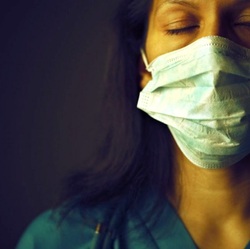
by Jerry Arroyo
Los Angeles Correspondent
Updated: 06/03/2012, 11:35 PM.
Working the night shift is linked with an increased risk of breast cancer in women, a new study suggests.
HealthDay reported that risk for breast cancer was highest among female shift workers who said that they are "morning people" instead of "night" people.
Medical News Today explained some possible explanations for the differences.
The researchers believe that one of the reasons could be that morning types are more susceptible to body clock disruption. Whilst "Owls" were twice as likely to develop breast cancer, the overall risk was even lower for "early birds" who did not work night shifts.
The researchers state that although insufficient sunlight has been associated with the development of various cancers, they found that those who worked night shifts tended to sunbathe more often than those working during the day. The study in the journal Occupational and Environmental Medicine included 210 women who developed breast cancer, and 900 women without breast cancer between 1964 and 1999 who were all part of the Danish Army, HealthDay reported. The researchers found that the increased breast cancer risk was seen with women who worked a night shift more than two times a week.
Other studies, including a 2001 study in the Journal of the National Cancer Institute and a 2005 study in mice in the journal Cancer Research have shown similar links between night shift work and breast cancer.
"Among shift workers, quite a number of factors could affect the mechanisms that control the body's circadian rhythms," Paul Rodgers, Ph.D., study researcher of the 2001 study who works at the Fred Hutchinson Cancer Research Center, said in a statement. "One is stress, considering the kinds of jobs that require shift work, from police, fire and rescue work to nuclear-power-plant monitoring to factory work, medicine and nursing."
However, researchers said in a 2007 review of the evidence published in the Scandinavian Journal of Work, Environment and Health that evidence is still inconclusive regarding shift work and general cancer risk. That study included about 3 million men and women from Sweden, though researchers acknowledged that only a small percentage of the people in the study met the requirements for "shift work."
Other research has linked shift work with health issues including weight problems and obesity, diabetes and sleep problems.
Los Angeles Correspondent
Updated: 06/03/2012, 11:35 PM.
Working the night shift is linked with an increased risk of breast cancer in women, a new study suggests.
HealthDay reported that risk for breast cancer was highest among female shift workers who said that they are "morning people" instead of "night" people.
Medical News Today explained some possible explanations for the differences.
The researchers believe that one of the reasons could be that morning types are more susceptible to body clock disruption. Whilst "Owls" were twice as likely to develop breast cancer, the overall risk was even lower for "early birds" who did not work night shifts.
The researchers state that although insufficient sunlight has been associated with the development of various cancers, they found that those who worked night shifts tended to sunbathe more often than those working during the day. The study in the journal Occupational and Environmental Medicine included 210 women who developed breast cancer, and 900 women without breast cancer between 1964 and 1999 who were all part of the Danish Army, HealthDay reported. The researchers found that the increased breast cancer risk was seen with women who worked a night shift more than two times a week.
Other studies, including a 2001 study in the Journal of the National Cancer Institute and a 2005 study in mice in the journal Cancer Research have shown similar links between night shift work and breast cancer.
"Among shift workers, quite a number of factors could affect the mechanisms that control the body's circadian rhythms," Paul Rodgers, Ph.D., study researcher of the 2001 study who works at the Fred Hutchinson Cancer Research Center, said in a statement. "One is stress, considering the kinds of jobs that require shift work, from police, fire and rescue work to nuclear-power-plant monitoring to factory work, medicine and nursing."
However, researchers said in a 2007 review of the evidence published in the Scandinavian Journal of Work, Environment and Health that evidence is still inconclusive regarding shift work and general cancer risk. That study included about 3 million men and women from Sweden, though researchers acknowledged that only a small percentage of the people in the study met the requirements for "shift work."
Other research has linked shift work with health issues including weight problems and obesity, diabetes and sleep problems.
 RSS Feed
RSS Feed


